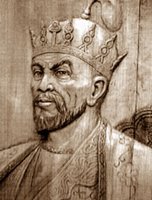 To my right sat a man with pronounced Mongolian features. He had no tattoo on his hand and his shirt was buttoned up to the collar, so I decided to call him Chenghiz. Before I get accused of racism, how many Mongolian names do you know? He didn’t look like a Timurlane, so I settled on Chenghiz.
To my right sat a man with pronounced Mongolian features. He had no tattoo on his hand and his shirt was buttoned up to the collar, so I decided to call him Chenghiz. Before I get accused of racism, how many Mongolian names do you know? He didn’t look like a Timurlane, so I settled on Chenghiz.Chenghiz, sensing my indiscriminate xenophobia, successfully managed to avoid all eye contact during the entire flight. Under his seat he had an animal basket. I wondered what was inside. It was going to be a long flight.
Above: Timurlane, not sitting next to me on the flight.
To the front was the panel, once a creamy white colour with flecks of brown. Now the panel was a creamy brown colour with flecks of brown. Dominating the scene was a dead fly somebody had swatted on the panel. With nothing else to look at directly in front of me, my eyes were continually drawn to the dead fly. A live fly buzzed its way onto Chenghiz’s head. I wondered if the flight would be more exciting if there were two dead flies on the panel, and how I could get the fly off his head and onto the panel. It was going to be a long flight.
To my left was the window. Outside, Moscow Airport was cold, wet and grey. The plane took off.
Now an experienced Aeroflot passenger, I knew not to try to sleep until pieces of meat and half-slices of bread had been served, lights had been flashed on and off, duty-free goods offered, and some more light-flashing had happened.
 I’d read that Aeroflot has a reasonable safety record on international flights, but on domestic flights its safety checking is not up to standard. I wondered if Aeroflot considered a flight from the Russian capital to another city in the former Soviet Union an international flight or a domestic one. I hadn’t needed any kind of transit visa for Moscow Airport, after all. Nobody had even asked me if I was carrying a nuclear device. And this plane was definitely less colourful inside than the Berlin-Moscow flight. No blues and oranges here, but a forgettable mix of greys and faded creamy browns.
I’d read that Aeroflot has a reasonable safety record on international flights, but on domestic flights its safety checking is not up to standard. I wondered if Aeroflot considered a flight from the Russian capital to another city in the former Soviet Union an international flight or a domestic one. I hadn’t needed any kind of transit visa for Moscow Airport, after all. Nobody had even asked me if I was carrying a nuclear device. And this plane was definitely less colourful inside than the Berlin-Moscow flight. No blues and oranges here, but a forgettable mix of greys and faded creamy browns.  The staff smiled even less radiantly than before. Their cheeks would tense slightly and teeth would show, but it wasn’t a smile, more of a grimace. The male steward serving row 10 and beyond didn’t even bother trying, but walked up and down the aisle, a bald onion-coloured (i.e. brown) head with a sad Slavic face. I named him Igor and knew it was going to be a long flight.
The staff smiled even less radiantly than before. Their cheeks would tense slightly and teeth would show, but it wasn’t a smile, more of a grimace. The male steward serving row 10 and beyond didn’t even bother trying, but walked up and down the aisle, a bald onion-coloured (i.e. brown) head with a sad Slavic face. I named him Igor and knew it was going to be a long flight.My in-flight meal was pancakes. These were like two little envelopes, stuffed with what looked like meat and vegetables with a splash of cheese sauce on top. Russian pancakes are good, I’ve eaten them before. And yes, there was the half-slice of individually wrapped Russian bread. No cherry tomato this time, though.
Biting into the vegetable pancake I was taken by surprise by a sweet apple filling. Beside me, Chenghiz was slurping away at his food quite happily. (I’ve since learned that Kyrgyz people like slurping.) Still no sign of what was in the animal basket. I’d been hoping the smell of food would provoke some noise from it, but I was wrong.
Biting into the meat pancake I was taken by surprise by a chocolate filling. You just can’t trust these Russians, even their food surprises you. The cheese sauce turned out to be some kind of
 Communist custard. I don’t know how to describe Communist custard. It’s vaguely yellow, but somehow manages to taste brown. Apart from the individually wrapped half-slice of (brown) Russian bread, it was a thoroughly disappointing meal. And I felt cheated out of my cherry tomato. Maybe cherry tomatoes are too colourful for flights in deepest darkest Russia.
Communist custard. I don’t know how to describe Communist custard. It’s vaguely yellow, but somehow manages to taste brown. Apart from the individually wrapped half-slice of (brown) Russian bread, it was a thoroughly disappointing meal. And I felt cheated out of my cherry tomato. Maybe cherry tomatoes are too colourful for flights in deepest darkest Russia.It was going to be a long flight, looking at a squashed fly and thinking about my cherry tomato.
Tea or coffee was served by Igor. Anita had told me that many Russian words were similar to Croatian ones. If I could speak Croatian, that would be fine. But I don’t speak Croatian.
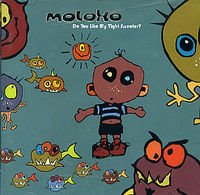
The woman to the right of Gengiz said “chai” and then muttered something in reply to Igor’s question, and got a slice of lemon with her tea. Chenghiz then said “chai” and his reply to the question was “moloko”, and he got some milk. Aha! Mljieko in Croatian, Mleko in Serbian, Moloko in Ukrainian, and in Russian too by the sound of it. I felt quite proud of myself. Well, it was a long flight.
Igor proffered his little tray for my cup. I put it on there, said “chai”, and eagerly awaited his question. The question didn’t come but the tray did. Confused, I tried to take it. Igor didn’t let go.
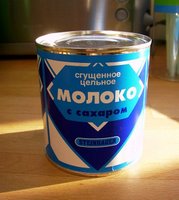 Even more confused, I looked up at him. I can’t read Russian faces, and his face was particularly inscrutable. He could have stood there until the plane landed in Bishkek without moving a single facial muscle.
Even more confused, I looked up at him. I can’t read Russian faces, and his face was particularly inscrutable. He could have stood there until the plane landed in Bishkek without moving a single facial muscle.I looked down at my chai, and enlightenment dawned as realised I had tried to take the whole tray instead of just my cup. I didn’t feel so proud of myself any more. I looked up at Igor as I took my chai. He looked back with a very Putinesque stare. I wasn’t sure what his stare meant.
 It might have been saying “Stupid foreign person trying to take my tray” or it could equally have been saying “Try that again and I’ll cut off your gas supplies this winter.” Travelling can be difficult sometimes.
It might have been saying “Stupid foreign person trying to take my tray” or it could equally have been saying “Try that again and I’ll cut off your gas supplies this winter.” Travelling can be difficult sometimes.After that, Igor didn’t serve row 10 any more.
Flying high over the Russian countryside gives no idea of perspective. Everything looks flat when you’re so far above the land. Occasional rivers cutting a channel through the land remind you that the earth is three-dimensional, but otherwise there’s no way of knowing. Heading south east from Moscow, we flew over thousands of miles of countryside, and saw very little in the way of habitation. The fields were mostly four-sided, lined by
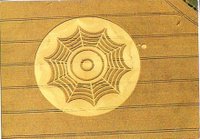 hedges or maybe trees, interspersed by irregularly shaped forests. The aliens who create crop-circles clearly weren’t interested in Russia this summer. Strange how they seem to like Wiltshire and Somerset so much.
hedges or maybe trees, interspersed by irregularly shaped forests. The aliens who create crop-circles clearly weren’t interested in Russia this summer. Strange how they seem to like Wiltshire and Somerset so much. Above: crop circles, a Westcountry speciality.
Twice we flew over a strange pattern on the ground below: three long rectangular fields lying parallel to each other and of equal width, each bordered by hedges, and this pattern zig-zagged into the distance. I saw the start of one of these and there was no sign of human life, no indication as to why the zig-zag should start or end there. We were flying at cruising altitude and I could see a long way across land, so these strange zig-zags must have been huge. I’ve no idea what they were. The land inside the zig-zags was a different colour from the rest of the countryside. If anybody has any idea what they were, I’d like to know. It was a long flight, after all.
Gradually the green fields of Russia were replaced by the Kazakh steppe, and this was in turn replaced by brown (formerly Communist) desert. This gradually turned into brown mountains, some topped with white snow.
I began to think about my arrival in Bishkek. Martin’s advice to me had been:
3. To get from the airport to Bishkek you need to take a taxi – might be quite expensive. They will rip you off, but I guess there is nothing you can do about it, except that the organization will come for you.
I’d also emailed the Aiesec girls in Kyrgyzstan to ask how I should get from the airport to Bishkek and I was quite pleased that one of them had promised to come and meet me.
The day I left Germany, I got an email from her:
I just want to be sure, are you coming on the 2nd of September at 4.35am?
No! I’m coming tomorrow, on the 1st of September at 4.00pm! Of course I emailed her with the correct time, but I’d received no reply. Was she coming to meet me on Friday afternoon or Saturday morning? It occurred to me that they hadn’t given me any address in Bishkek. Once I arrived at the airport, I had no idea where I should go. This had the potential to become a problem: landing in a strange country, not speaking the language, and not knowing where to go.
The plane finally landed at Manas Airport, the international airport of Bishkek, 45 minutes late. As we taxied along the runway, I was surprised to see half a dozen big fat US Air Force planes. I shouldn’t have been surprised: the Kyrgyz government allowed the US to use its airport as a base for the invasion of Afghanistan.
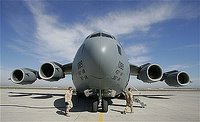 This was the first US military presence in the former Soviet Union. Local politics being local politics, the Russian Air Force soon had its own base at a runway just down the road. The Americans were politely asked to leave Manas, and were allowed to remain only after agreeing to pay much more rent than previously negotiated.
This was the first US military presence in the former Soviet Union. Local politics being local politics, the Russian Air Force soon had its own base at a runway just down the road. The Americans were politely asked to leave Manas, and were allowed to remain only after agreeing to pay much more rent than previously negotiated.Manas Airport is not a big airport but unlike Moscow Airport they had several desks open to check the passports and visas, and the passengers were quickly processed. After a cursory check, my passport was stamped with a magic rubber stamp which left no mark on the pages. If you don’t believe in magic, the logical explanation would be that there was simply no ink left on the stamp. I was surprised that entering Kyrgyzstan was far less painful than entering Ukraine.
Luggage reclamation. I found my sleeping bag hidden behind a pillar, and so far all was well, apart from not knowing if I was going to be met and what I should do if I wasn’t. Wait at the airport until 4.35 am the next day? Make my own way to Bishkek and hope to find an internet café? Chingiz had left his animal basket unattended. In the interests of public security, I peeked inside:
a dog.
Three angry airport staff were explaining to confused passengers that they all had to prove ownership of their luggage by correlating it with the little stickers on their passports. I’ve never seen that before. Once past them, luggage had to be scanned again to make sure it contained no dangerous items. I’ve never seen that before either. Scanning the luggage after the flight? Where’s the sense in that? Maybe they hope that some Russian passengers might try to smuggle nuclear devices out of the country.
Finally, I was through to the arrivals lounge. The Aiesec girl, Lena, waved to me. That was a relief.
A friend of hers drove us to Bishkek. Lena had read my email two hours before the plane landed, and had only just made it in time. She wasn’t too impressed that the plane was then 45 minutes late.
We drove into Bishkek, to the school where I would be teaching. Ulan, the boss, came out to say hello, and took me to my flat. Just three minutes’ walk away, I had the place to myself. Large living room, bedroom with balcony, kitchen and bathroom. The walls were a creamy brown colour, and the carpets were all a very definite Communist brown. Even the fridge was a faded brown.
Ulan had to return to the school, and dispatched Lena to bring me enough food to last me for a couple of days.
Shower. Bed. Sleep.
I had arrived in Bishkek, and things were looking good. Brown, but good.
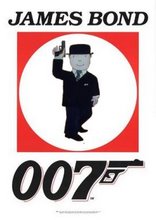
1 comment:
So you made it in one piece! Good. Can't wait to read your experiences with the locals (and with the bearded women of course)! Good luck!
Post a Comment